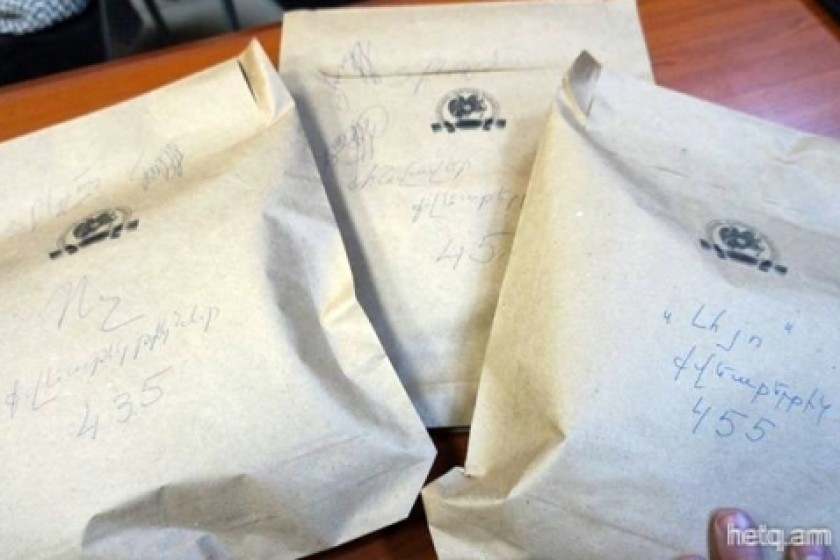
Armenia's Prosecutor General Unwilling to Seriously Combat Election Fraud
In the fight against election fraud, one of the main steps, if not the most important, is for the government to punish those found guilty to the full extent of the law.
The courts in Armenia, however, hand out the lightest sentences possible to those committing election fraud; the culprits are usually issued fines. Prosecutors, when reviewing such sentences, do not files appeals. The December 6, 2015 referendum to change Armenia’s Constitution was no exception.
Armenia’s Prosecutor General has examined 597 reports of fraud – media articles and written complaints filed by NGOs and citizens – alleged to have taken place during the referendum campaign, on election day and afterwards.
The Prosecutor General’s office has informed Hetq that as of October 14, 583 criminal case files have been prepared regarding fraud charges in last year’s referendum.
Based on Criminal Code Article 149 (Hindrance to implementation of the right to elect, to the work of election commissions or to the implementation of the authority of the person participating in elections), Article 150 (Forgery of election or voting results) and Article 153 (Voting more than once or instead of another person), 79 criminal cases have been initiated. 47 criminal cases have been sent to the courts with a guilty conclusion, of which 43 resulted in a guilty verdict.
600,000 AMD Fines
On the day of last year’s referendum, Tornik Vardanyan served as a member of the election committee at Yerevan’s 5/21 polling station. Vardanyan was later charged with voting in place three other individuals.
At the Arabkir and Kanaker-Zeytoun District Court, Vardanyan confessed to the crime and was fined 600,000 AMD (US$1,260).
We should note that the law specifies a fine of between 500,000 and 700,000 AMD or 2-3years imprisonment for voting more than once or instead of another person.
Davit Azatyan, who served as a member of the Yerevan 4/26 polling station committee, was also fined 600,000 by the same court for voting in lieu of another.
Arman Ghazaryan, who served as a member of the Yerevan 3/06 polling station committee, was also fined the same amount. He was found guilty of trying to vote for five others.
Gor Toumanyan, serving as a member of the Yerevan 10/15 polling station committee, illegally filed personal information in the registration book for six voters and then voted in their place.
He too was fined the traditional 600,000 AMD for the violation.
Imprisoned, but Not Behind Bars
On the day of the constitutional referendum. Henrik Shahbazyan served as president of the 28/35 polling station in the village of Kotayk.
After the voting, he and other committee members tallied the ballot. They concluded that 611 people had cast ballots – 301 in favor of the referendum and 304 opposed. Six ballots were deemed void.
Four copies of the vote tally were drafted and signed by Shahbazyan, the committee secretary and its members. One copy was placed in the ballot bag and another suffixed to the polling station wall.
The bag with the ballots and the voter registration book was then taken, with police escort, to the local head election committee office located in the Abovyan municipality.
Since Shahbazyan was a supporter of the referendum and taking advantage of the situation, he forged the election results to show that 911 people voted, and not 611. The forged 300 votes were all in favor of the referendum’s passage.
In court, Shahbazyan was found guilty of violating Criminal Code Article 150 and sentenced to three years. He received the lightest sentence possible. He could have gotten five years behind bars.
His sentenced was later reduced to one-year probation.
Then, there’s the case of Anahit Simonyan, who, as the president of the 15/18 polling station on the Aragatzotn village of Voskevaz forged the vote results to show that referendum passed instead of being rejected.
She too was found guilty of Article 150 and sentenced to three years. Simonyan was later freed on probation.
These are just a few examples of the government’s unwillingness to get tough on voter fraud.
The pronouncements made by the Prosecutor General and other state agencies that those committing election fraud will be prosecuted to the full extent of the law are fairy tales.
The fact that the Prosecutor General’s office fails to appeal the light sentences handed down by the courts proves this to be the case.
 Videos
Videos Photos
Photos




Write a comment